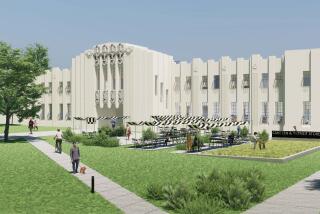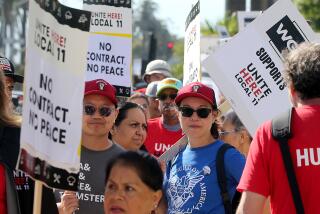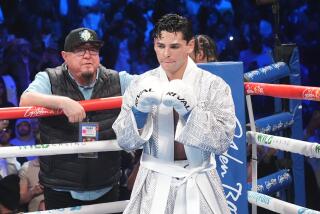Kennedys Call for Knocking Down Ambassador Hotel
A son of Robert F. Kennedy, standing blocks from the spot where his father was assassinated in 1968, said Thursday he believed the Los Angeles Unified School District should demolish the Ambassador Hotel to build schools without preserving any of it as a monument.
Maxwell Kennedy, surrounded by neighborhood children during a news conference at MacArthur Park, said new schools on the Ambassador site would be âa fitting memorialâ for his father, gunned down in a pantry off the hotel kitchen after a speech celebrating his victory in the state Democratic presidential primary.
Kennedy released a letter signed by himself, six of his siblings and his mother, Ethel Kennedy, calling on the school district to clear the site for an expeditious building of schools in the predominantly Latino neighborhood.
The Kennedysâ involvement in what is a local issue over how the school district should reconfigure the storied hotel sends a strong message to the Board of Education, which is scheduled to vote Oct. 12 on a plan for the Ambassador.
âI am confident [the board] will come to the right decision, and the only way to do that is to tear down everything that is there nowâ and build a school complex there as quickly as possible, Kennedy said. He added that he planned to meet with each of the seven members of the school board and Supt. Roy Romer.
After years of debate and study, Romer developed what he considered a compromise plan from among five options for the site. Romerâs $318.2-million proposal, backed by school board President Jose Huizar, calls for razing most of the hotel to make room for a 4,200-student complex for youngsters in kindergarten through high school.
Parts of the historic hotel, however, would be preserved at a cost of about $15 million, including the Cocoanut Grove nightclub and the Paul Williams-designed coffee shop.
And, though Romer has said he is unsure exactly how to preserve the pantry where Robert Kennedy was shot, he has said he would appoint a panel to develop ideas for it. If the pantry were to be saved, under Romerâs plan it would be moved from its current location at a cost of $2 million -- money the Kennedy family believes would be better used for schools.
In an interview Thursday, Romer said the âfeelings of the Kennedys are very important to me. I have thought about that before, and I will continue to think about it.â
But Romer added that his job was to find a plan that would pass board muster, avoid lawsuits and get a school built while still acknowledging the historic value of the site.
âI know the community is divided, and I have tried to find a compromise,â Romer said. âI have got to get this school built, because the children are going to be hurt if I donât.â
About 3,800 students are bused out of overcrowded neighborhoods around the hotel to schools with more room. The district has long planned to use the hotel site as part of its ambitious program to build 160 new schools over about a decade.
The debate has always been over how best to place a school on the 23-acre site of the hotel, which closed in 1989 -- how much should be preserved for its historic value and at what cost.
A spokeswoman for Huizar, who was unavailable for comment Thursday, said the school board president had spoken with Ethel Kennedy and was aware of the familyâs feelings before he and Romer announced the compromise plan, known as Heritage K-12.
âThose considerations were part of his thinking to arrive at the Heritage K-12 plan,â said Monica Garcia, Huizarâs chief of staff. âHe focused on the plan that will bring the best school to the community, get board approval and get on its way.â
Though Garcia could not say whether Maxwell Kennedyâs increased activities would cause Huizar to rethink the plan, she emphasized that the Kennedy familyâs concerns were considered in arriving at the compromise.
Romerâs plan has angered both preservationists, who feel much more of the hotel should be saved and incorporated into the school design, and other activists who decry the additional costs and construction delays even the compromise option would entail.
The Kennedys, at least some of whom had signaled their opposition to any preservation plan earlier, sided with the RFK-12 Coalition, the teachers union and others who want to open a school complex as soon as possible -- and without any of the voter-approved school construction bond money going to preservation instead of classrooms.
A week earlier, Maxwell Kennedy had detailed his feelings in an opinion article in The Times. âThe Ambassador Hotel has nothing to do with who my father was or what he tried to do with his life,â Kennedy wrote.
Linda Dishman, executive director of the Los Angeles Conservancy, which has led the fight to preserve most of the hotel, said the Kennedy familyâs stance should not carry too much weight, given all the other historic events and significant people who had been a part of the hotel.
âWhile we are certainly very respectful of the Kennedy family and their association with the hotel, the historic significance of the hotel is much more than just the assassination,â Dishman said. She noted that the sites of John F. Kennedyâs and Martin Luther King Jr.âs assassinations have been preserved.
In its prime, the seven-story Ambassador, which opened in 1921, played host to some of Hollywoodâs biggest stars and the cultural icons of the day, and several Academy Awards ceremonies were held there.
Although two board members -- Mike Lansing and David Tokofsky -- have said they do not support Romerâs plan, Huizar said as recently as a week ago that he believed he had at least the four votes needed for approval.
Tokofsky, a former history teacher, has begun floating yet another proposal. It calls for saving all of the hotel and converting it to office space for district employees and charter schools, for which building and safety standards are not as strict as those for district-operated schools.
Under the proposal, new schools for district students could be built on the grounds surrounding the hotel.
More to Read
Sign up for Essential California
The most important California stories and recommendations in your inbox every morning.
You may occasionally receive promotional content from the Los Angeles Times.











